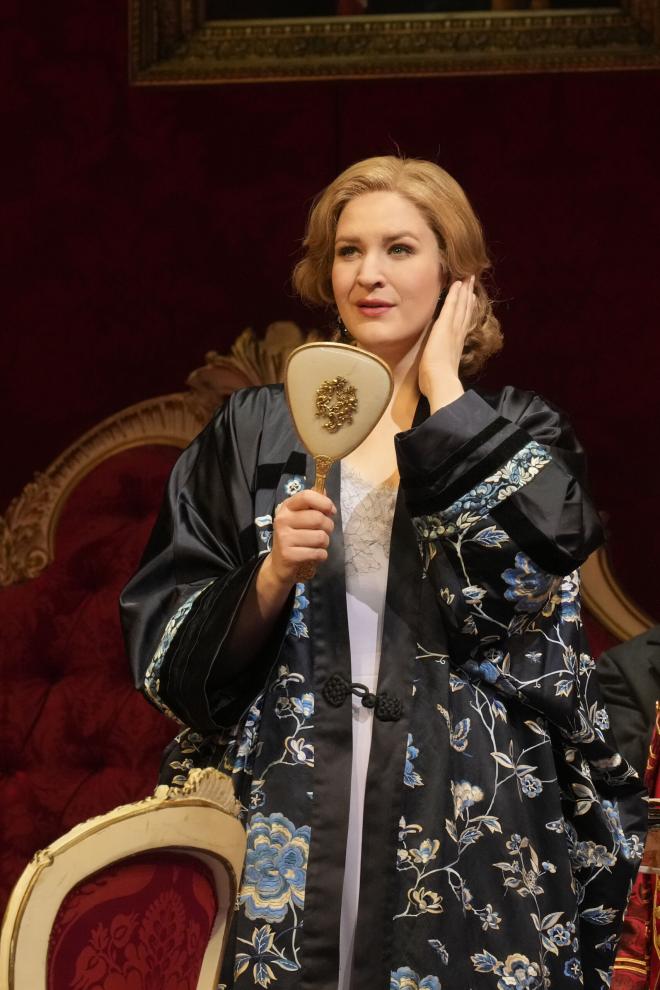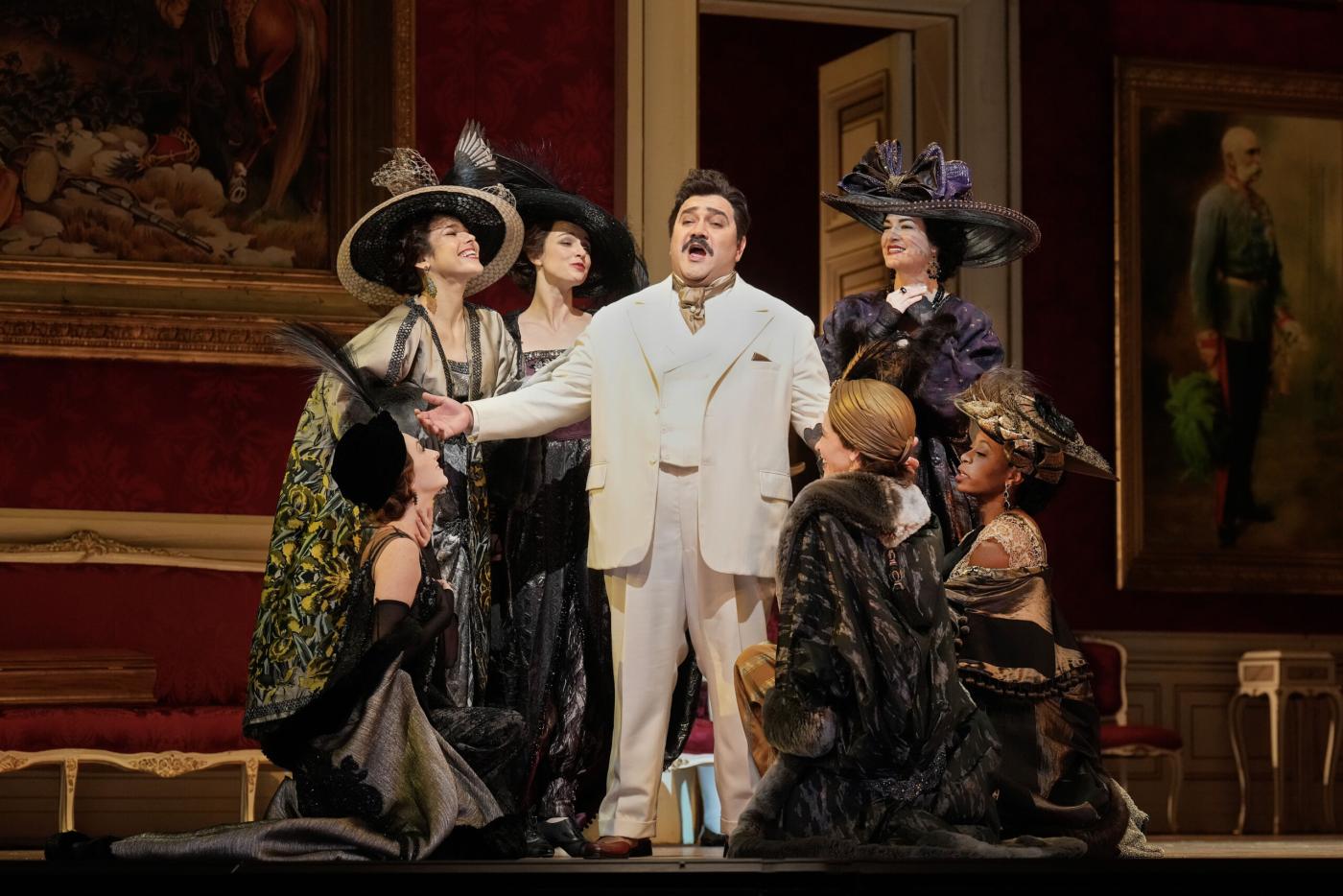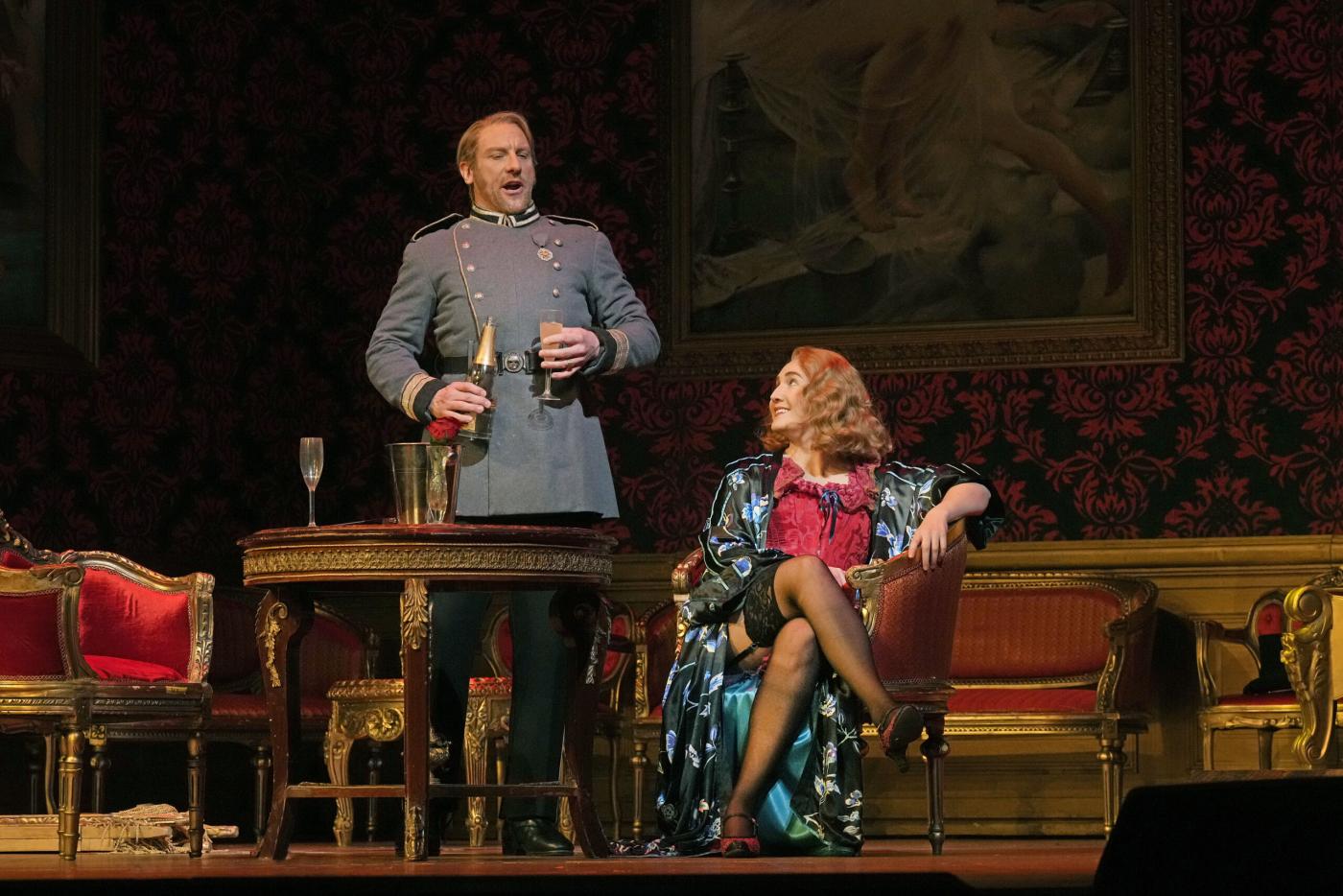WETA PBS presents “Great Performances at the Met: Der Rosenkavalier”, a repeat of the Metropolitan Opera’s live HD broadcast from the Met’s stage earlier this year. This is a fine opportunity to experience a first-class performance of one of Richard Strauss’s most popular operas right from your personal screen. WETA PBS is pleased to broadcast this presentation on Sunday, September 24 at 2:00 p.m. (ET). A synopsis of each Act is provided below.
Der Rosenkavalier revels in the splendor and elegance of old Vienna as the backdrop for bittersweet romance with touches of comedy. This Met production featured soprano Lise Davidsen as the Marschallin, a character who comes to terms with the evolving stages of life and love. Mezzo-soprano Samantha Hankey appears in the trouser role (a male character written for high voice and traditionally performed by a female singer) as the Marschallin’s younger lover, Count Octavian Rofrano; soprano Erin Morley stars as Sophie, the young ingénue who steals Octavian’s heart; and bass Günther Groissböck is the oafish Baron Ochs. Simone Young conducts this production, which transports the action from the 1700s to 19th century Vienna. The opera is sung in German, supplemented by English subtitles.
While the title character of the opera, Der Rosenkavalier (The Knight of the Rose), refers to Octavian, the Marschallin (a Field Marshall’s wife) is central and crucial to the story. She is a worldly, composed woman of stature and wealth. Yet she is complex: stately and discreet when necessary, playful and loving in intimate scenes with Octavian. She is wise to the fact that Octavian will eventually leave and take a younger lover; in fact, the final scene of the opera in which the Marschallin bids Octavian farewell and lovingly blesses his union with the young Sophie is heartbreaking. We witness the Marschallin’s evolution to a mature vision of life, with gracious acceptance. The role of the Marschallin is often performed by a veteran singer who can credibly portray someone seasoned by the stages of life. For years, it was Renée Fleming’s signature role. For this production, the Met chose Norwegian soprano Lise Davidsen, who, at 36, has received critical acclaim for her work in formidable roles in major opera houses, and takes on the role of the Marschallin with a commanding presence. The New York Times said of her performance in this production: “Throughout, Davidsen alternates between conversational restraint — enunciating each syllable of Hugo von Hofmannsthal’s talky libretto with penetrating focus — and white-hot radiance. Her terms of endearment for Octavian emerge like a rising sun.”
What makes Der Rosenkavalier an enduring favorite since its premiere in 1911 is not only a human story of heartbreak, love and humor but Strauss’s sophisticated music that combines Classical refinement, elegant Viennese waltzes, lush orchestration and grand, complex arias. The libretto was written by Hugo von Hofmannstal, who wrote the libretto for Strauss’s other operas, Elektra, Ariadne auf Naxos, Arabella and Die frau ohne Schatten. In addition to dialogue, von Hofmannstal allows his characters to philosophize and comment on social customs.
We hope you’ll set aside some time for this special Metropolitan Opera presentation of an eternal classic.
Act I:
After a night together, Princess Marie Therese von Werdenberg (the Marschallin) and her younger lover, Count Octavian Rofrano, declare their passion for each other. Suddenly, they hear voices outside their door, believing that the Marschallin’s husband has returned. Octavian hides and re-emerges in a skirt and bonnet, pretending to be the female maid, “Mariandel”. He unsuccessfully tries to leave when Baron Ochs, the Marschallin’s country cousin, bursts through the door to announce his engagement to young Sophie von Faninal, the bourgeois daughter of a wealthy merchant. Although a nobleman, Ochs has little money, so asks the Marschallin to lend him her notary to write a marriage contract and to recommend a nobleman to serve as his Rosenkavalier (The Knight of the Rose) to deliver the traditional silver betrothal rose to Sophie. Marschallin recommends the young man in a portrait – Count Octavian Rofrano. Then disorder ensues in the salon: Ochs makes a pass at “Mariandel”, who flees, and an array of idiosyncratic characters -- a hairdresser, merchants, a notary to squelch Ochs’s desire to acquire Sophie’s property free and clear, and an Italian singer -- arrive. Finally alone, the Marschallin poignantly reflects on her life: lost youth, an unhappy marriage and the wistful recognition that her relationship with Octavian will end. When Octavian returns, the Marschallin she tells him that he will soon leave her for a younger, prettier woman. He protests that he will always love her, but she sends him away.
Act II:
At von Faninal’s palace, Octavian arrives amid great splendor as Der Rosenkavalier. He presents the silver engagement rose to Sophie, and the two instantly become infatuated with each other. Ochs arrives in unruly style with a brutish entourage and inappropriate comments. Sophie rejects him and intends to cancel the wedding. Sophie and Octavian sing a love duet, and Octavian challenges Ochs to a dual for Sophie’s hand. Sophie’s father rejects her pleas to call off the wedding and threatens to send her back to the convent. He orders Octavian to leave. Ochs stumbles and cuts himself on Octavian’s sword, and as he tends to his injury, is heartened to receive a letter from “Mariandel”, inviting him to a secret rendezvous.
Act III:
Ochs meets “Mariandel” at an ill-kempt hotel for a supposed tryst but Ochs’s mood sours when he believes he sees his enemy, Octavian, in the face of “Mariandel”, and becomes haunted by visions of apparitions in the room. Various characters enter to interrupt the presumed lovers, including a woman who accuses Ochs of fathering her children. The chaos brings the police as well as Sophie and her father, who are scandalized by Ochs’s behavior. Sophie calls off the wedding to Ochs. “Mariandel” leaves and returns as Octavian. The Marschallin enters and confesses that she, Octavian and others set up this false rendezvous to break Ochs’s engagement to Sophie. Embarrassed, Ochs and the sordid entourage depart, leaving only the Marschallin, Octavian and Sophie. Each reflects on love, and in a tender and moving finale, the Marschallin graciously yields her relationship with Octavian to Sophie, wishing them joy and happiness. She leaves Octavian and Sophie alone to sing, “We are together. All else is like a dream.”
Take Note!
Teachers, parents, students, and music lovers – take note! Welcome to our portal to deepening your love and knowledge of classical music. Explore masterpieces, meet our greatest composers and performers, and learn all things classical with episodes of Classical Breakdown and your host, John Banther. Don’t forget to check out fun and creative activities that accompany your listening experience!


